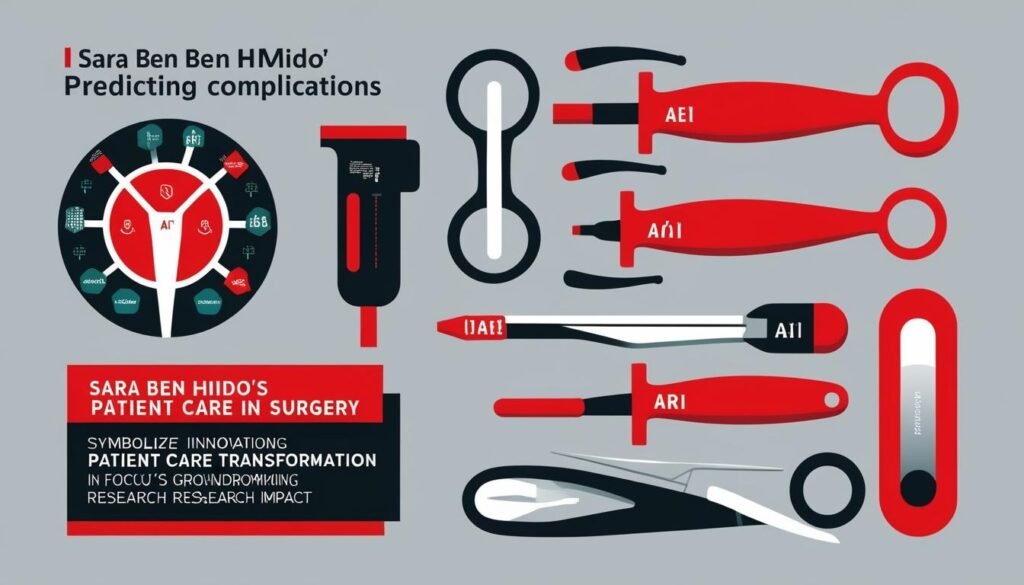Sara Ben Hmido has developed a predictive AI model for colorectal cancer surgeries, aiming to enhance patient care and surgical decision-making.
In a groundbreaking development for healthcare technology, Sara Ben Hmido, a young Moroccan researcher, has made substantial strides in the integration of artificial intelligence (AI) and surgery. In October 2023, she pilot tested the world’s first predictive AI model during live surgery at Amsterdam UMC, a significant milestone aimed at predicting complications in colorectal cancer patients, such as anastomotic leaks.
This innovative AI model utilises real-time patient data, including metrics like blood pressure and blood loss, to assess risks associated with surgical procedures. Such capability supports surgeons in making critical decisions. For instance, the model assists in determining whether a high-risk patient should undergo a colostomy instead of repairing the intestine, thereby potentially decreasing severe outcomes. Moreover, it allows low-risk patients to bypass unnecessary invasive procedures, often resulting in earlier discharge from the hospital.
Speaking to Morocco World News, Ben Hmido elaborated on the aim of her research: “Our model is tuned to generate an individualized risk prediction for that specific patient,” utilising the patient’s current pre-operative parameters. This tailored approach enhances the quality of patient care by providing data-driven insights to guide decision-making.
The implications of this technology extend beyond individual patient outcomes, potentially impacting healthcare systems at large. “That’s a benefit that’s very welcome for the whole healthcare system,” Ben Hmido remarked, highlighting the model’s prospects for reducing complications, costs, and the workload on medical staff.
Ben Hmido’s passion for integrating machine learning into the medical sphere stems from its potential to transform healthcare fundamentally. “My fascination with machine learning in healthcare stems from its transformative potential to revolutionize the field,” she stated. A crucial aspect of her research is examining how risk predictions influence the doctor-patient decision-making process, which she identifies as a significant challenge. To address this, she is working with her team to draft protocols and recommend legislation to regulate the application of the AI model, ensuring that patient rights are safeguarded.
However, incorporating AI into surgical practices also raises unique challenges, particularly regarding patient autonomy and ethical considerations. “In medicine, decisions directly impact patient lives, requiring transparency and trust to ensure safety and accountability,” Ben Hmido explained. She also touched on challenges related to data handling, privacy concerns, and the necessity to use high-quality data for training AI models. To effectively realise AI’s potential, she advocates for a collaborative approach that involves technologists, clinicians, and policymakers.
Ben Hmido emphasised that countries like Morocco have significant potential to advance AI-driven healthcare systems. She expressed the notion that “the key to fully realizing this potential lies in enhancing the quality and reach of healthcare services while building robust digital infrastructure, such as electronic health record (EHR) systems.” Such foundational improvements are critical to the successful implementation of AI in healthcare, which could not only benefit Morocco but also offer a projective example for other nations.
Addressing prevalent worries about AI’s potential to replace jobs within the healthcare sector, Ben Hmido reassured that AI is a complementary tool rather than a replacement. “I firmly believe that AI will not take away any jobs in healthcare,” she stated, underscoring the irreplaceable human aspects that define medical roles, such as the empathy and compassion of nurses and the nuanced decision-making abilities of surgeons. She concluded by advocating for AI as an essential decision-support tool that streamlines processes and enables healthcare professionals to concentrate on delivering compassionate, personalised care.
Source: Noah Wire Services
- https://advalvas.vu.nl/en/science-education/ai-model-gives-first-ever-predictive-advice-during-surgery/ – Corroborates the development and pilot testing of the world’s first predictive AI model during live surgery by Sara Ben Hmido, and its use in predicting complications such as anastomotic leaks in colorectal surgery.
- https://advalvas.vu.nl/en/science-education/ai-model-gives-first-ever-predictive-advice-during-surgery/ – Details the AI model’s use of real-time patient data, including blood pressure and blood loss, to assess surgical risks and support surgeons in critical decision-making.
- https://advalvas.vu.nl/en/science-education/ai-model-gives-first-ever-predictive-advice-during-surgery/ – Explains how the model helps in determining whether high-risk patients should undergo a colostomy instead of intestinal repair and how it can lead to earlier hospital discharge for low-risk patients.
- https://middleeasthealth.com/focus/interviews/the-importance-of-juniors-in-research-a-spotlight-on-sara-ben-hmido/ – Provides insights into Sara Ben Hmido’s research focus on predictive machine learning for early detection of postoperative complications and her views on the transformative potential of AI in healthcare.
- https://middleeasthealth.com/focus/interviews/the-importance-of-juniors-in-research-a-spotlight-on-sara-ben-hmido/ – Discusses the challenges of ensuring responsible use of machine learning, data privacy concerns, and the need for high-quality data, as well as the importance of collaboration among technologists, clinicians, and policymakers.
- https://advalvas.vu.nl/en/science-education/ai-model-gives-first-ever-predictive-advice-during-surgery/ – Addresses ethical considerations, patient autonomy, and the need for transparency and trust in AI-driven decision-making processes in surgery.
- https://middleeasthealth.com/focus/interviews/the-importance-of-juniors-in-research-a-spotlight-on-sara-ben-hmido/ – Highlights Ben Hmido’s perspective on the potential of AI-driven healthcare systems in countries like Morocco and the importance of enhancing healthcare services and digital infrastructure.
- https://advalvas.vu.nl/en/science-education/ai-model-gives-first-ever-predictive-advice-during-surgery/ – Reassures that AI is a complementary tool rather than a replacement for healthcare professionals, emphasizing the irreplaceable human aspects of medical roles.
- https://middleeasthealth.com/focus/interviews/the-importance-of-juniors-in-research-a-spotlight-on-sara-ben-hmido/ – Supports the idea that AI can streamline healthcare processes, enabling professionals to focus on delivering compassionate and personalized care.
- https://advalvas.vu.nl/en/science-education/ai-model-gives-first-ever-predictive-advice-during-surgery/ – Mentions the survey conducted by Sara Ben Hmido to gauge patient confidence in the AI model and the model’s ability to provide explanations for its predictions.
- https://middleeasthealth.com/focus/interviews/the-importance-of-juniors-in-research-a-spotlight-on-sara-ben-hmido/ – Elaborates on the challenges faced by young researchers, including balancing research with academic commitments and introducing innovative ideas in traditional settings.


